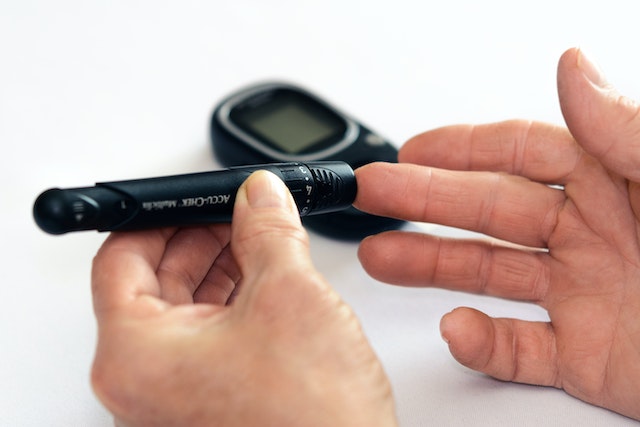What Is Diabetes?
Diabetes is a medical condition in which a person’s level of glucose, or blood sugar, is elevated.
In a properly functioning circulatory system, blood carries glucose to all the cells in the body in order to produce energy, while the pancreas produces insulin to help the body absorb excess glucose. High levels of glucose in the blood are an indication that the body is not producing enough insulin, or that the insulin produced is not working as it should to help the body absorb glucose, indicating a Diabetic or pre-Diabetic condition.
There are three types of Diabetes:
- Type 1, or “juvenile” Diabetes
- Type 2, or “adult onset” Diabetes, and
- Gestational Diabetes
Diabetes mellitus is the medical name for both Type 1 and Type 2 Diabetes. Pre-Diabetes is a condition in which blood glucose levels are elevated, indicating that an individual has a high risk of developing full-fledged Diabetes.
Diabetes is a very serious disease which can result in high blood pressure, damage to the eyes, nerve damage, kidney disease, heart disease, blindness, and stroke. In addition, it is not uncommon for a long term diabetic to loose limbs to amputation because of poor circulation. So, naturally, many people wonder: is diabetes a disability?
Symptoms of Diabetes
The presence of Diabetes is generally indicated by some combination of several symptoms. A diabetic will often experience unexplained:
- frequent need to urinate, especially if it is combined with extreme thirst,
- chronic hunger, especially between meals,
- fatigue,
- weight loss, and/or
- general feelings of irritability
Many diabetics report dry, itchy skin and trouble with genital itching and fungal infections. A tingling sensation or numbness in the feet is another indication, as is blurred vision. Finally, the skin of many diabetics is slow to heal from wounds, skin abrasions, or sores.
Diagnosis of Diabetes can be established through three types of blood tests. They are:
- A fasting plasma glucose test, which is given after an 8-hour fast;
- An oral glucose tolerance test, which is given after an 8-hour fast followed by the administration of a glucose-containing beverage and an additional 2-hour wait; or
- A random plasma glucose test, which measures blood glucose without any kind of fast.
The random plasma glucose test cannot be used to test for pre-Diabetes. If the test results indicate the presence of a Diabetic condition, the patient must undergo additional tests to confirm the diagnosis.
Is Diabetes a Disability?
Yes, diabetes is considered a disability by the Social Security Administration (SSA) if it leads to severe complications that significantly impacts someone's ability to to work full-time.
For your diabetes to be considered a disability, you need to be able to show that you are unable to work full time because of your disability.
 The SSA has a list of conditions that qualify individuals for Social Security disability benefits called the Blue Book. For example, diabetes can cause neuropathy, heart disease, and kidney disease among other conditions that qualify for disability.
The SSA has a list of conditions that qualify individuals for Social Security disability benefits called the Blue Book. For example, diabetes can cause neuropathy, heart disease, and kidney disease among other conditions that qualify for disability.
Can You Get Disability Benefits For Diabetes?
Yes, you can get disability for diabetes as long as you are able to show the SSA that it is severe enough where it impacts your ability to work full-time.
Sometimes, those with diabetes are unable to qualify if they can manage their disease through medication and lifestyle changes.
If you are unable to qualify through the diabetes listing in the SSA’s Blue Book, you might still be able to qualify under other conditions, as diabetes can cause vision loss, kidney disease and heart disease which are all conditions that also qualify for disability.
How To Qualify For Disability With Diabetes
Medical Qualifications
Diabetes is listed in the Social Security Administration’s (SSA) impairment listing manual, or “Blue Book,” as a condition which can qualify a person for Social Security Disability. The SSA makes no distinction between Type 1 and Type 2 Diabetes, however, and no mention is made in the Diabetes listing of any of the severe health problems caused by the condition.
Fortunately, many of these severe health problems are listed in the Blue Book as separate disabling conditions, as the SSA’s qualification criteria focus on the actual health problems that affect an applicant’s ability to function in work and basic tasks, rather than specifically on a Diabetes diagnosis.
Impairments that Qualify for Diabetes Disability Benefits
In order to qualify for disability benefits on the basis of Diabetes, your doctor must diagnose you as having Diabetes mellitus (Type 1 or Type 2 Diabetes) and at least one of the following conditions:
- Neuropathy - abnormality of the nervous system that must significantly affect two extremities to the extent that a person experiences a “sustained disturbance” of movement of those extremities, or in walking, or in simply standing.
- Acidosis - the abnormal increase in the acidity of bodily fluid that occurs at least once in every two months and which is documented by blood tests.
- Diabetic Retinopathy - damage to blood vessels inside the eye resulting in a significant loss of peripheral vision in the better of the two eyes, or a significant loss of visual acuity in the better of the two eyes. To meet this criterion, the severity of the damage must be such that the person is virtually blind.
Most of the time, applicants will be approved for disability benefits on the basis of Diabetes only in conjunction with one or more other disabling conditions that have been caused by the disease. Here are some signs your disability claim will be approved for Diabetes.
Financial Requirements
Once it is determined that you meet the medical requirements needed to get disability with diabetes, you need to also meet the work requirements or the financial requirements.
SSDI Financial Requirments
If you are applying for Social Security Disability Insurance (SSDI) with diabetes, you need to have a certain number of work credits to qualify as SSDI benefits are for those who at one point could work full time, but now can’t because of a disability like diabetes. Work credits are earned by working and paying into Soical Security taxes. A general rule of thumb is if you worked for at least 5 of the last 10 years, you will have enough work credits.
SSI Financial Requirments
If you are looking to apply for Supplemental Security Income (SSI) with diabetes, you need to meet the financial requirements as SSI benefits are for those with a disability like diabetes, but with very limited income and resources.
The SSA has a chart on their website and where you can see where your income limits lineup to their qualifications. If you met the financial and medical requirements for SSI benefits with diabetes, you may be able to get disability for diabetes.
What If My Diabetes Doesn't Meet The Requirements?
If you do not meet the requirements to get disability for diabetes, you can also try submitting a Medical Vocational Allowance. By doing so, a disability doctor will fill out a Residual Functional Capacity (RFC) form. This form will explain how you are unable to do daily tasks and work due to your diabetes.
The majority of disability claims are denied at the initial application stage. Because of this, you should consider speaking with a disability attorney. They can help you determine if you qualify and may be able to help you apply for benefits.
If you still are unable to get approved for disability benefits, other state, federal, and non-profit resources may be able to help you (see What Benefits Are Diabetics Entitled To below).
How Much is Disability Paycheck Worth with Diabetes?
The average disability paycheck with diabetes is worth a little over $1,300 per month, however you could earn more than that depending on your case. The maximum disability check you can get per month is $3,627 per month.
A disability lawyer will be able to tell you how much disability you can get.
What Benefits Are Diabetics Entitled To?
If you have diabetes, there are a number of benefits that you may qualify for that can help you maintain your health and manage your disease. If your symptoms are so severe that you can’t work, or if you have medical conditions related to diabetes that make it impossible for you to work, you may be eligible for SSI or disability benefits. You can apply for SSI or disability benefits and may be given money monthly to help you pay for things like housing and healthy food. You also could qualify for benefits like:
Medicare
Medicare is government-funded health insurance that is available to people who are over the age of 65, or people who are younger than 65 who have certain serious health conditions. Medicare can pay for your treatment and your prescriptions and medications that you need to manage diabetes.
WIC
You may qualify for WIC (The Women, Infants, & Children Nutrition Program) if you are under 18 or if you have a child under the age of 18 or if you are pregnant. WIC is a supplemental program that helps women and children under 18 by paying money that can be used for formula, diapers, some over-the-counter medications, and a wide variety of healthy food.
Medicaid
Medicaid is government-funded health insurance for low-income people and children. There are certain requirements that you must meet in order to qualify for Medicaid, but Medicaid provides comprehensive health insurance and prescription coverage for people who qualify.
Local or non-profit aid
Many communities have local charities or non-profit groups that provide education, rides to the pharmacy, and money for prescription drugs like insulin or for blood sugar monitors. Some health insurance companies also provide vouchers to help pay for medication.
You Could Earn Up to $3,627 Per Month! Get a Free Case Evaluation
If you are disabled because of the health impairments caused by Type 1 or Type 2 Diabetes prevent you from working, you may very well be entitled to Diabetes disability benefits.
 To see how much you could earn for disability for diabetes, use our Social Security benefits calculator to see how much you could be able to earn in Social Security Disability benefits.
To see how much you could earn for disability for diabetes, use our Social Security benefits calculator to see how much you could be able to earn in Social Security Disability benefits.
Although total disability based on Diabetes and its related conditions can be difficult to prove compared to other disabling conditions, working closely with your doctors and a qualified Social Security Disability attorney or disability advocate can help to ensure that your Diabetes disability case can have the highest possible chance of success.
